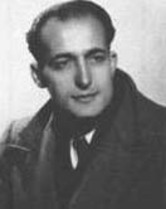
Nikos Gatsos
1911 (1914?) – 1992
Nikos Gatsos as a young man.
Nikos Gatsos was a Greek poet, critic, and translator. He was born in the village of Asea, in Arcadia in the Peloponnese, and went to school in Tripoli and Athens. By the time he entered the University of Athens to study philosophy he was already a fluent speaker of English and French. In Athens he came into contact with literary figures, particularly the poet Odysseus Elytis, with whom he formed a life-long friendship. His first collections of verse, short poems written in a classical style, were published in the magazines Nea Estia (1931) and Rythmos (1933). For most of the decade, however, he dedicated himself to reviews and literary criticism. In 1943, during the Nazi occupation of Greece, Gatsos published his major work, the surrealist epic poem Amorgos. Written in one night of inspired concentration, the poem was a distinctive re-imagining of the Greek poetic tradition, composed at a time of mortal danger for the Greek people.
With their country bound to the sails and their oars hung on the wind
The shipwrecked voyagers slept tamely like dead beasts in sheets of sponge
Amorgos was soon recognized as a major work, but proved to be the only book Gatsos published in his career, though he continued to publish poems in literary magazines, such as ‘Elegy’ (1946) and ‘The Knight and Death’ (1947).
After the war he worked as a literary critic and translator, particularly of plays. For the Greek theatres he produced translations of works by Lorca, Strindberg, O’Neil, Jean Genet and others. After part of Amorgos was set to music by Manos Hadzidakis, he established a new and influential role as a lyricist for Greece’s popular composers, notably Hadzidakis, Theodorakis, Xarhakos, among others. Many of his songs are of great beauty and clarity, and helped to introduce a rare quality into Greek popular music. In later years Gatsos established himself as a unique literary figure in Greece. Holding court in various Athenian cafés, he attracted intellectuals and writers, both foreign and Greek, and gave firm but gentle guidance to aspiring poets. He died in Athens in 1992, and was buried in the village of his birth, as he had requested.
Texts & References on this site
- A Greek Quintet contains the poems Amorgos, Death and the Knight, and four songs (pp. 173–86).